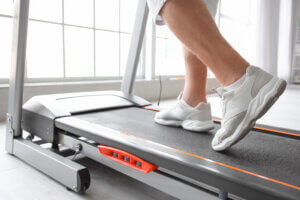February is American Heart Month – a great time to take stock of your cardiac health and, if needed, consider cardiopulmonary rehabilitation. What is cardiopulmonary rehabilitation? It’s a multi-pronged approach to improving heart health in people who have experienced or are experiencing heart or lung disease. It’s particularly important after heart surgery or a heart attack or for those suffering chronic lung conditions.
Cardiopulmonary rehabilitation combines exercise, nutrition, education and emotional support to establish a personalized long-term health plan that can help curb the risk of future heart and lung health problems. Here we explore the specifics of cardiopulmonary rehabilitation and its positive impacts on patient lifestyle and longevity.
Understanding Cardiopulmonary Conditions
Your cardiovascular system includes your heart, arteries, veins and capillaries, working together to pump adequate blood flow to all parts of the body. Sometimes, both due to genetic and lifestyle factors, your cardiovascular system experiences trauma or disease, which can lead to heart failure. Heart attack is perhaps the most common of these, however, there are a variety of common heart-related issues, including:
- Angina
- Aortic disease
- Aortic stenosis
- Arrhythmias
- Atrial fibrillation
- Cardiomyopathy
- Cerebrovascular disease
- Congenital heart disease
- Coronary artery disease
- Endocarditis
- Heart attack
- Heart failure
- Heart palpitations
- Peripheral arterial disease
- Pulmonary hypertension
- Stroke
- Valve disease
These conditions can lead to interventions that ultimately require cardiopulmonary rehabilitation. Common cardiac interventions include:
- Ablation
- Angioplasty and stenting
- Coronary artery bypass surgery
- Defibrillation
- Heart or lung transplant
- Heart valve repair or replacement
Delving into Pulmonary Conditions
 Your heart and lungs go hand-in-hand. While the heart is responsible for pumping oxygen-filled blood throughout the body, your lungs and airways infuse that oxygen into the blood, and help remove carbon dioxide from the body. It’s important to understand these two systems work in tandem, and they both need to be kept in working order for long-term health and wellness. A variety of common lung diseases can make this challenging. Some of those include:
Your heart and lungs go hand-in-hand. While the heart is responsible for pumping oxygen-filled blood throughout the body, your lungs and airways infuse that oxygen into the blood, and help remove carbon dioxide from the body. It’s important to understand these two systems work in tandem, and they both need to be kept in working order for long-term health and wellness. A variety of common lung diseases can make this challenging. Some of those include:
- Asthma
- Bronchiectasis
- Pulmonary fibrosis
- Pulmonary hypertension
- Sleep apnea
- COPD
- Bronchitis
- Emphysema
- Tuberculosis
- Connective tissue disease
- Lung cancer
- Cystic fibrosis
- Pulmonary embolism
- Obstructive lung disease
If you’ve ever been short of breath or suffered an asthma attack, you understand how scary chronic pulmonary conditions can be. In addition to keeping your heart healthy and pumping, cardiopulmonary rehabilitation can also empower your overall wellbeing by improving your lungs and airways.
The Role of Cardiopulmonary Rehabilitation
In considering cardiopulmonary rehabilitation, it can be helpful to liken the practice to training for a race. But in this instance, the race is getting back to your desired lifestyle, and there is no finish line, just the goal of prolonged heart and lung health and wellness. Cardiopulmonary rehabilitation offers a variety of long-term heart and lung benefits, including:
- Relieving symptoms of heart problems, including chest pain
- Strengthening the body and cardiovascular system after a heart attack
- Establishing healthier habits, including:
- Exercise
- Quitting smoking
- A heart-healthy diet
- Increasing energy and strength
- Reducing stress
- Preventing future illness and death from heart disease
- Identifying appropriate medication prescriptions
It’s important to keep in mind that cardiopulmonary rehabilitation offers a safe path of recovery, one designed specifically for you and your condition under the guidance of medical expertise. Turning to your cardiopulmonary rehab team is an excellent way to improve cardiovascular fitness and enhance respiratory function, reducing the risks associated with cardiovascular and pulmonary disease.
The Multidisciplinary Approach
 Cardiopulmonary rehab examines your return to health from all sides, enlisting a team of experts who create a personalized plan. Often, the program begins before you are discharged from the hospital. Typically, cardiopulmonary rehab falls into three phases – inpatient, outpatient and personal at-home initiatives.
Cardiopulmonary rehab examines your return to health from all sides, enlisting a team of experts who create a personalized plan. Often, the program begins before you are discharged from the hospital. Typically, cardiopulmonary rehab falls into three phases – inpatient, outpatient and personal at-home initiatives.
If the rehab program is a race, then your healthcare team can be considered your coaches and support crew. Most often, cardiopulmonary rehabilitation relies on a team of experts, including your cardiac or pulmonary healthcare providers, exercise physiologists, physical therapists, nutritionists and counselors. Some programs can include group participation as well.
Who Can Benefit from Cardiopulmonary Rehabilitation?
People who have suffered a heart problem, such as a heart surgery, heart attack, heart failure or congenital heart condition are eligible for cardiac rehab. Similarly, patients with chronic pulmonary conditions or lung disease such as COPD, asthma or cystic fibrosis benefit from pulmonary rehab. Talk with your healthcare team to learn if you’re eligible for cardiopulmonary rehabilitation.
Keep up with the latest advice and updates from Aspen Valley Hospital.
HJ: Mind & Body
Components of Cardiopulmonary Rehabilitation Programs
Cardiopulmonary rehab programs typically consist of a medical examination (and check-ups during future visits), exercise program and monitoring your progress. Exercise is key to heart and lung health, so your healthcare team will design and customize a workout regimen that addresses your specific health and lifestyle concerns and objectives. Some of these activities can include running, cycling, rowing, walking, hiking, swimming and yoga. The frequency and duration of exercise is up to your rehab team. They might also suggest strength training to complement cardio exercise.
Whether you’re experiencing trepidation regarding a new exercise program or you’re gung ho to hit the Peloton, it’s important to look to your rehab team for guidance on how frequently and how hard you should exercise.
Education and Counseling
 While exercise is an essential element to rehabbing your heart and lungs and keeping them healthy, it can quickly become a moot point if you’re not also modifying any potentially harmful lifestyle choices.
While exercise is an essential element to rehabbing your heart and lungs and keeping them healthy, it can quickly become a moot point if you’re not also modifying any potentially harmful lifestyle choices.
This is where medical counseling comes into your cardiopulmonary rehabilitation plan. It can be hard to identify and change long-established lifestyle habits. But your rehab team is here to help you do just that, offering lifestyle modification guidance. Some of those lifestyle changes might include:
- Diet and nutrition changes
- Quitting smoking
- Limiting alcohol use
- Modifying your sleep hygiene
Your counselor can also offer coping strategies for psychological wellbeing, including meditation and mindfulness practices, yoga, support groups, connecting with nature, and how to avoid triggering situations.
Nutritional Support
Your diet and nutrition choices are another important building block in your cardiopulmonary rehab program. As part of your journey to better health, you’ll most likely work with a dietitian who can help you achieve a balanced diet. Dietitians are experts in identifying heart-healthy foods and making healthy eating attainable and enjoyable. These dietary steps are key to maintaining a healthy weight and avoiding foods that contribute to heart disease.
Benefits of Cardiopulmonary Rehabilitation
Without question, the biggest benefit of cardiopulmonary rehabilitation is lower rates of adverse events (including death) as a result of heart and lung disease. Working with your cardiopulmonary rehab team and being diligent about exercise, diet and lifestyle choices can lead to a lifetime of notable benefits, including:
- Enhanced physical function
- Decreased pain
- Reduced inflammation
- Preventing depression
- Reducing stress and anxiety
- Improving psychological and emotional wellbeing
- Promoting tissue repair
Additionally, cardiopulmonary rehabilitation aims to reduce hospital readmissions by empowering long-term health and wellness and breaking the cycle of illness. Working with a dedicated team of medical professionals can curb the negative effects of heart and lung disease and put you back in control of your health.
Challenges and Considerations
 The benefits of cardiopulmonary rehabilitation are many, however, they can seem daunting. Sticking to any long-term health or fitness program can feel overwhelming. Don’t hesitate to revisit your rehab team when the going gets tough or you feel like giving up. Adhering to rehabilitation plans is the only way they work in the long run, so it’s important to work with experts and support professionals to overcome barriers and tap into motivational strategies.
The benefits of cardiopulmonary rehabilitation are many, however, they can seem daunting. Sticking to any long-term health or fitness program can feel overwhelming. Don’t hesitate to revisit your rehab team when the going gets tough or you feel like giving up. Adhering to rehabilitation plans is the only way they work in the long run, so it’s important to work with experts and support professionals to overcome barriers and tap into motivational strategies.
Conclusion
Cardiopulmonary health is the foundation of our body’s ability to function. Paying close attention to our heart and lungs is an excellent way to stay ahead of life-threatening diseases, especially for those with a personal or family history of it. If you’re worried about your cardiopulmonary wellness or you’ve experienced heart or lung disease, talk with your medical provider to learn more about rehabilitation options.

